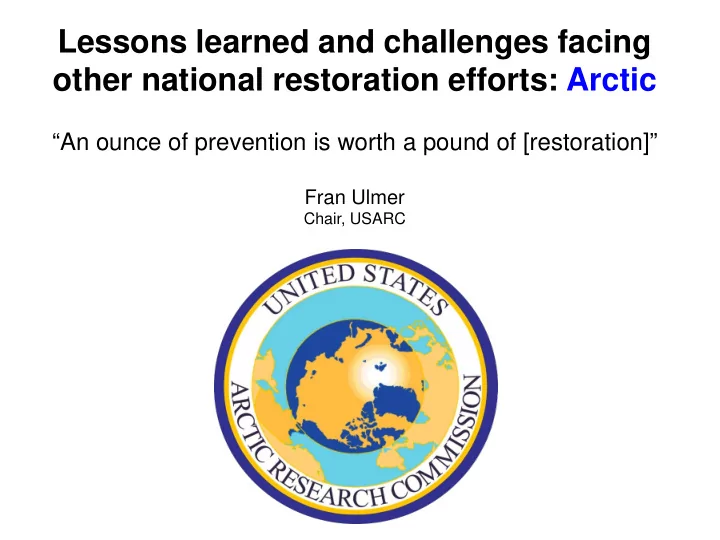

Lessons learned and challenges facing other national restoration efforts: Arctic “An ounce of prevention is worth a pound of [restoration]” Fran Ulmer Chair, USARC
Arctic region (defined in US law)
Sea ice extent is decreasing
Sea ice is also thinning… March 1985 March 2011
Warming thaws permafrost: erosion & methane release Gary Clow, USGS
Alaskan Arctic coastal villages Two-hour time lapse showing storm damage in Shismaref, Alaska
“ The opening of the ‘ fifth ocean, ” the Arctic, for longer periods of time, will provide new access to resources, migration of fishing stocks and eventually new trade routes, that can ’ t be overstated. ” -Chief of Naval Operations Adm. Gary Roughead (2010)
“ Only 7% of the Arctic Ocean has been mapped to modern (multibean) standards ” -Larry Mayer (10/11) Univ. of New Hampshire USCG ’ s Healy (fore) & Canada ’ s Louis St-Laurent
Arctic has much of world ’ s remaining “ undiscovered ” fossil fuel 13% oil 30% natural gas 20% natural gas liquids 2009 USGS CARA report
Recommendations for the Arctic • Drill with utmost care…sensitive environment • Stronger science foundation is needed • Industry & Coast Guard should address: – Oil-spill response – Containment – Search and rescue • Develop Arctic intl’ drilling standards
Arctic Challenges • Threats to subsistence culture • Incomplete baseline data to design mitigation strategies and assess environmental impact • Cumulative impacts • Shipping impacts • Response in icy conditions - Human health & safety concerns - Appropriate technology/tools
Baseline data, syntheses, research • USGS “gap analysis” • New syntheses of Arctic marine ecosystem research by federal agencies, industry, and others • DOI/BOEM Environmental Studies Program (SOAR) • Shell/CP/Statoil/NOAA partnership 15
USARC’s Oil Spill White Paper Recommends: • Expanded endowment funding for research • Oil spill trajectory research • Research into fate, metabolism and effects • Improve stakeholder consultation • Reinvigorate the Interagency Coordinating Committee on Oil Pollution Research (ICCOPR) www.arctic.gov
Improve Prevention & Preparedness • Environmental risk and impact assessments • Emergency response assets, equipment, and supplies • Improve knowledge for Arctic incident response through training and engagement of the communities, responders, and industry • International cooperation and sharing best practices (Arctic Council)
Today’s recommendations (1): • Develop US Arctic strategy to complement policy (action plan) • Expand “Arctic Observing Network” (know the region) • IMO needs to complete “Polar Code” (safer shipping) • Oil-spill-in-ice research (ICCOPR, industry JIP, NAS Study, X Prize) • Conduct spill response drill (“Spills of National Significance”, 2013?)
Today’s recommendations (2): • Ocean infrastructure (we ’ re down to one icebreaker) • Learn from Arctic neighbors (SINTEF, Canadians) • Develop environmental response tools (NOAA’s Arctic ERMA) • Ratify UNCLOS (join 162 other nations) • Complete and enforce an Arctic Council instrument on Marine Oil Pollution Preparedness & Response (new intl’ treaty)
Exxon Valdez Oil Spill Alaska 1989
Restoration Exxon Valdez Oil Spill Trustee Council • Formed ‘91 to oversee restoration of the ecosystem via $900M settlement • Consists of 3 state and 3 federal trustees • Still monitoring, 20-years later • Investing: - $216M reimburse fed. & state govt. (and Exxon) - $178M research, monitoring & restoration - $375M habitat protection - $145M restoration reserve - $42 M public info, sci. management, admin.
Subscribe to “Arctic Update” e-newsletter: www.arctic.gov
Recommend
More recommend